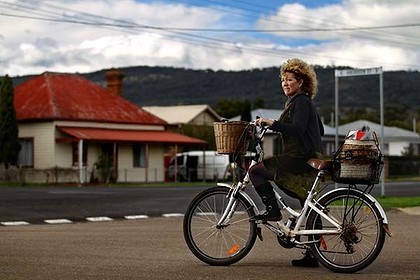
In 46 years of bike riding, Sue Abbott has never worn a helmet. So when the highway patrol pulled her over in country Scone and fined her for a no-helmet offence, she decided to fight.
The 50-year old mother of four has never been in trouble with the law, has never fallen from her bike, and thought it ridiculous she could not ride at 15km/h on a dedicated cycleway with an uncovered head.
A police video of the incident last year records the sergeant surmising ''it's a hair thing'', a view shared by many people when they first meet her.
But Ms Abbott says it's nothing to do with her exuberant hair. Her objections are based on her belief that wearing a helmet increases the risk of brain damage - and that forcing her to wear one is a breach of her civil liberties.
When she tried that argument in the Scone local court, the magistrate would have none of it. He fined her $50 plus costs.
But when she appealed and laid out her view in the District Court in March, she went a long way to persuading the judge that, 19 years after the laws came into force, there is still no clear evidence of their benefit.
Ms Abbott argued that if she fell from her bike while wearing a helmet she would be at greater risk of brain damage from ''diffuse external injury'', an injury similar to shaken baby syndrome, than if she fell on her bare head.
It may seem ridiculous to suggest helmets could do anything other than improve one's chances in an accident and reduce the number of brain injuries, but there is a serious debate under way on the subject in international medical and transport safety journals - and Judge Roy Ellis happily admitted his own doubts about the laws.
''Having read all the material, I think I would fall down on your side of the ledger,'' the judge told Ms Abbott after she had spelt out her case against the laws that exist in few countries other than Australia and New Zealand.
''I frankly don't think there is anything advantageous and there may well be a disadvantage in situations to have a helmet - and it seems to me that it's one of those areas where it ought to be a matter of choice.''
He found Ms Abbott had ''an honestly held and not unreasonable belief as to the danger associated with the use of a helmet by cyclists'', and quashed her conviction, although he still found her offence proven.
Now Scone police ignore Ms Abbott as she cycles to town, although one yelled at her ''you're not in Paris now'' - a remark which prompted her to send police a photograph of herself bareheaded on a bike on the Champs-Elysees marked ''Greetings from Paris''.
Ms Abbott's success in court delighted Bill Curnow of the Cyclists Rights Action Group. In several peer-reviewed publications he has argued there has been no reduction in brain injury levels due to helmet laws.
Why force cyclists to wear helmets when politicians ignored a 1998 report from the Federal Office of Road Safety that showed brain injury rates among motorists would be cut by up to 25 per cent, even where airbags were fitted, if drivers wore bicycle helmets, he said.
Associate Professor Chris Rissel and his colleague Dr Alexander Voukelatos of the University of Sydney's school of public health fuelled debate on the issue with a recent paper saying we would be better off without the laws.
But Professor Frank McDermott, who led the original campaign for them, said repealing them would be guaranteed to increase head injury rates and Dr Rissel's paper was flawed.
''It'll be as backward a step as it would be to tell motorists they don't have to wear seatbelts,'' he said on ABC radio.
Ms Abbott said that was a ridiculous comparison.
''I should be entitled to make this call about whether I can wear a helmet.
''You can still smoke, we are eating and drinking ourselves into early graves, but you can't ride a bicycle without a helmet,'' she said.
TWIST LOGIC
SUE ABBOTT told the court a helmet can ''increase angular acceleration which an oblique impulse imparts to the head, increasing the risk of damage to the brain, especially diffuse axonal injury''.
In other words, the helmet grips the road, twisting the head more quickly than if the skull were unprotected.
Evidence from Bill Curnow cited a report from the National Health and Medical Research Council that warns ''the wearing of helmets may result in greater rotational forces and increased diffuse brain injury''.
From the Sydney Morning Herald
